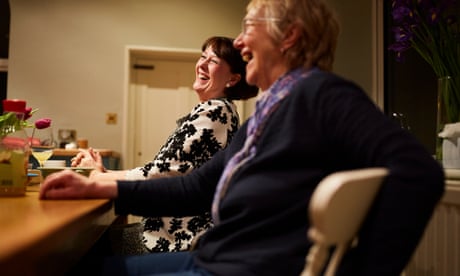Why, beyond middle age, people get happier as they get older writes The Economist

ASK people how they feel about getting older, and they will probably reply in the same vein as Maurice Chevalier: “Old age isn't so bad when you consider the alternative.” Stiffening joints, weakening muscles, fading eyesight and the clouding of memory, coupled with the modern world's careless contempt for the old, seem a fearful prospect—better than death, perhaps, but not much. Yet mankind is wrong to dread ageing. Life is not a long slow decline from sunlit uplands towards the valley of death. It is, rather, a U-bend.
When people start out on adult life, they are, on average, pretty cheerful. Things go downhill from youth to middle age until they reach a nadir commonly known as the mid-life crisis. So far, so familiar. The surprising part happens after that. Although as people move towards old age they lose things they treasure—vitality, mental sharpness and looks—they also gain what people spend their lives pursuing: happiness.
This curious finding has emerged from a new branch of economics that seeks a more satisfactory measure than money of human well-being. Conventional economics uses money as a proxy for utility—the dismal way in which the discipline talks about happiness. But some economists, unconvinced that there is a direct relationship between money and well-being, have decided to go to the nub of the matter and measure happiness itself.
These ideas have penetrated the policy arena, starting in Bhutan, where the concept of Gross National Happiness shapes the planning process. All new policies have to have a GNH assessment, similar to the environmental-impact assessment common in other countries. In 2008 France's president, Nicolas Sarkozy, asked two Nobel-prize-winning economists, Amartya Sen and Joseph Stiglitz, to come up with a broader measure of national contentedness than GDP. Then last month, in a touchy-feely gesture not typical of Britain, David Cameron announced that the British government would start collecting figures on well-being.
There are already a lot of data on the subject collected by, for instance, America's General Social Survey, Eurobarometer and Gallup. Surveys ask two main sorts of question. One concerns people's assessment of their lives, and the other how they feel at any particular time. The first goes along the lines of: thinking about your life as a whole, how do you feel? The second is something like: yesterday, did you feel happy/contented/angry/anxious? The first sort of question is said to measure global well-being, and the second hedonic or emotional well-being. They do not always elicit the same response: having children, for instance, tends to make people feel better about their life as a whole, but also increases the chance that they felt angry or anxious yesterday.
Statisticians trawl through the vast quantities of data these surveys produce rather as miners panning for gold. They are trying to find the answer to the perennial question: what makes people happy?
Four main factors, it seems: gender, personality, external circumstances and age. Women, by and large, are slightly happier than men. But they are also more susceptible to depression: a fifth to a quarter of women experience depression at some point in their lives, compared with around a tenth of men. Which suggests either that women are more likely to experience more extreme emotions, or that a few women are more miserable than men, while most are more cheerful.
Two personality traits shine through the complexity of economists' regression analyses: neuroticism and extroversion. Neurotic people—those who are prone to guilt, anger and anxiety—tend to be unhappy. This is more than a tautological observation about people's mood when asked about their feelings by pollsters or economists. Studies following people over many years have shown that neuroticism is a stable personality trait and a good predictor of levels of happiness. Neurotic people are not just prone to negative feelings: they also tend to have low emotional intelligence, which makes them bad at forming or managing relationships, and that in turn makes them unhappy.
Whereas neuroticism tends to make for gloomy types, extroversion does the opposite. Those who like working in teams and who relish parties tend to be happier than those who shut their office doors in the daytime and hole up at home in the evenings. This personality trait may help explain some cross-cultural differences: a study comparing similar groups of British, Chinese and Japanese people found that the British were, on average, both more extrovert and happier than the Chinese and Japanese.
Then there is the role of circumstance. All sorts of things in people's lives, such as relationships, education, income and health, shape the way they feel. Being married gives people a considerable uplift, but not as big as the gloom that springs from being unemployed. In America, being black used to be associated with lower levels of happiness—though the most recent figures suggest that being black or Hispanic is nowadays associated with greater happiness. People with children in the house are less happy than those without. More educated people are happier, but that effect disappears once income is controlled for. Education, in other words, seems to make people happy because it makes them richer. And richer people are happier than poor ones—though just how much is a source of argument (see article).
The view from winter
Lastly, there is age. Ask a bunch of 30-year-olds and another of 70-year-olds (as Peter Ubel, of the Sanford School of Public Policy at Duke University, did with two colleagues, Heather Lacey and Dylan Smith, in 2006) which group they think is likely to be happier, and both lots point to the 30-year-olds. Ask them to rate their own well-being, and the 70-year-olds are the happier bunch. The academics quoted lyrics written by Pete Townshend of The Who when he was 20: “Things they do look awful cold / Hope I die before I get old”. They pointed out that Mr Townshend, having passed his 60th birthday, was writing a blog that glowed with good humour.

Mr Townshend may have thought of himself as a youthful radical, but this view is ancient and conventional. The “seven ages of man”—the dominant image of the life-course in the 16th and 17th centuries—was almost invariably conceived as a rise in stature and contentedness to middle age, followed by a sharp decline towards the grave. Inverting the rise and fall is a recent idea. “A few of us noticed the U-bend in the early 1990s,” says Andrew Oswald, professor of economics at Warwick Business School. “We ran a conference about it, but nobody came.”
Since then, interest in the U-bend has been growing. Its effect on happiness is significant—about half as much, from the nadir of middle age to the elderly peak, as that of unemployment. It appears all over the world. David Blanchflower, professor of economics at Dartmouth College, and Mr Oswald looked at the figures for 72 countries. The nadir varies among countries—Ukrainians, at the top of the range, are at their most miserable at 62, and Swiss, at the bottom, at 35—but in the great majority of countries people are at their unhappiest in their 40s and early 50s. The global average is 46.
The U-bend shows up in studies not just of global well-being but also of hedonic or emotional well-being. One paper, published this year by Arthur Stone, Joseph Schwartz and Joan Broderick of Stony Brook University, and Angus Deaton of Princeton, breaks well-being down into positive and negative feelings and looks at how the experience of those emotions varies through life. Enjoyment and happiness dip in middle age, then pick up; stress rises during the early 20s, then falls sharply; worry peaks in middle age, and falls sharply thereafter; anger declines throughout life; sadness rises slightly in middle age, and falls thereafter.
Turn the question upside down, and the pattern still appears. When the British Labour Force Survey asks people whether they are depressed, the U-bend becomes an arc, peaking at 46.
Happier, no matter what
There is always a possibility that variations are the result not of changes during the life-course, but of differences between cohorts. A 70-year-old European may feel different to a 30-year-old not because he is older, but because he grew up during the second world war and was thus formed by different experiences. But the accumulation of data undermines the idea of a cohort effect. Americans and Zimbabweans have not been formed by similar experiences, yet the U-bend appears in both their countries. And if a cohort effect were responsible, the U-bend would not show up consistently in 40 years' worth of data.
Another possible explanation is that unhappy people die early. It is hard to establish whether that is true or not; but, given that death in middle age is fairly rare, it would explain only a little of the phenomenon. Perhaps the U-bend is merely an expression of the effect of external circumstances. After all, common factors affect people at different stages of the life-cycle. People in their 40s, for instance, often have teenage children. Could the misery of the middle-aged be the consequence of sharing space with angry adolescents? And older people tend to be richer. Could their relative contentment be the result of their piles of cash?
The answer, it turns out, is no: control for cash, employment status and children, and the U-bend is still there. So the growing happiness that follows middle-aged misery must be the result not of external circumstances but of internal changes.
People, studies show, behave differently at different ages. Older people have fewer rows and come up with better solutions to conflict. They are better at controlling their emotions, better at accepting misfortune and less prone to anger. In one study, for instance, subjects were asked to listen to recordings of people supposedly saying disparaging things about them. Older and younger people were similarly saddened, but older people less angry and less inclined to pass judgment, taking the view, as one put it, that “you can't please all the people all the time.”
There are various theories as to why this might be so. Laura Carstensen, professor of psychology at Stanford University, talks of “the uniquely human ability to recognise our own mortality and monitor our own time horizons”. Because the old know they are closer to death, she argues, they grow better at living for the present. They come to focus on things that matter now—such as feelings—and less on long-term goals. “When young people look at older people, they think how terrifying it must be to be nearing the end of your life. But older people know what matters most.” For instance, she says, “young people will go to cocktail parties because they might meet somebody who will be useful to them in the future, even though nobody I know actually likes going to cocktail parties.”
Death of ambition, birth of acceptance
There are other possible explanations. Maybe the sight of contemporaries keeling over infuses survivors with a determination to make the most of their remaining years. Maybe people come to accept their strengths and weaknesses, give up hoping to become chief executive or have a picture shown in the Royal Academy, and learn to be satisfied as assistant branch manager, with their watercolour on display at the church fete. “Being an old maid”, says one of the characters in a story by Edna Ferber, an (unmarried) American novelist, was “like death by drowning—a really delightful sensation when you ceased struggling.” Perhaps acceptance of ageing itself is a source of relief. “How pleasant is the day”, observed William James, an American philosopher, “when we give up striving to be young—or slender.”
Whatever the causes of the U-bend, it has consequences beyond the emotional. Happiness doesn't just make people happy—it also makes them healthier. John Weinman, professor of psychiatry at King's College London, monitored the stress levels of a group of volunteers and then inflicted small wounds on them. The wounds of the least stressed healed twice as fast as those of the most stressed. At Carnegie Mellon University in Pittsburgh, Sheldon Cohen infected people with cold and flu viruses. He found that happier types were less likely to catch the virus, and showed fewer symptoms of illness when they did. So although old people tend to be less healthy than younger ones, their cheerfulness may help counteract their crumbliness.
Happier people are more productive, too. Mr Oswald and two colleagues, Eugenio Proto and Daniel Sgroi, cheered up a bunch of volunteers by showing them a funny film, then set them mental tests and compared their performance to groups that had seen a neutral film, or no film at all. The ones who had seen the funny film performed 12% better. This leads to two conclusions. First, if you are going to volunteer for a study, choose the economists' experiment rather than the psychologists' or psychiatrists'. Second, the cheerfulness of the old should help counteract their loss of productivity through declining cognitive skills—a point worth remembering as the world works out how to deal with an ageing workforce.
The ageing of the rich world is normally seen as a burden on the economy and a problem to be solved. The U-bend argues for a more positive view of the matter. The greyer the world gets, the brighter it becomes—a prospect which should be especially encouraging to Economist readers (average age 47).







